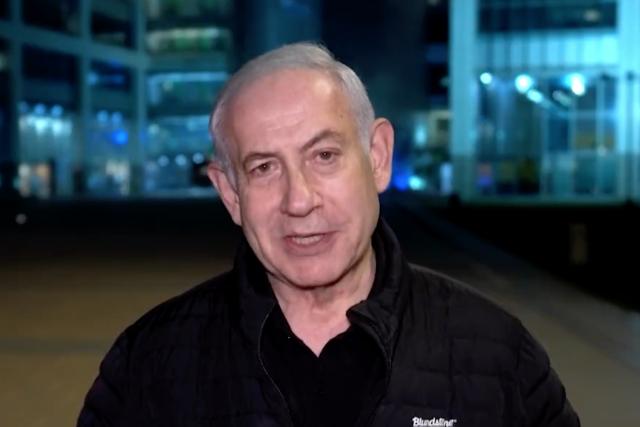In a significant development amid ongoing hostilities, Israel has announced the withdrawal of its negotiation team from Qatar, following Hamas's rejection of Israel's latest proposition aimed at securing a truce and resolving the hostage situation. This decision comes in the wake of reports by Hebrew media, signaling a deadlock in the negotiations aimed at easing the tensions and ending the conflict. Over the weekend, Israel agreed to a US proposal that would have seen the release of nearly 800 prisoners, some who are serving life sentences for murdering Israelis for just 40 hostages. Some had speculated that the unbalanced deal was accepted by Israel just so they could show the world how Hamas was not serious.
Prime Minister Benjamin Netanyahu's office released a statement, expressing a stark disillusionment with Hamas's stance, which it views as an unequivocal indication of the group's disinterest in pursuing further dialogue. The statement underscores the setback brought about by the recent United Nations Security Council resolution, which advocated for a ceasefire. According to the Prime Minister's Office (PMO), Hamas's demands, which call for an outright cessation of hostilities and a comprehensive withdrawal of the Israel Defense Forces (IDF) from Gaza before one hostage is even released, are seen as unyielding and impractical.
Prime Minister's Office says that Hamas has rejected the compromise proposal put on the table in Doha, as Israeli delegation heads back to Israel. PMO blames US failure to veto the UNSC resolution on the failure of the hostage talks, noting that Hamas welcomed the UNSC vote. https://t.co/kXbHM9BNiA
— Tovah Lazaroff (@tovahlazaroff) March 26, 2024
The PMO firmly stated, "Israel will not succumb to Hamas's unrealistic demands," highlighting a steadfast refusal to compromise on matters that jeopardize its security and sovereignty. A diplomatic source, cited by Hebrew-language media, elaborated on Hamas's rigid demands, which notably did not encompass any provisions for releasing hostages. This stance led to the conclusion that "there is no one to talk to on the other side," rendering the Israeli negotiating team's presence in Qatar pointless.
The situation was seemingly anticipated by Israel's United Nations envoy, who criticized the UN Security Council's resolution for potentially exacerbating Hamas's intransigence regarding the hostage negotiations. Ambassador Gilad Erdan expressed his disappointment, particularly noting the resolution's adverse effects on Israel's military operations and the overall efforts to secure the hostages' release.
Israel’s Ambassador to UN says failure to condemn #HamasTerrorists attack is a disgrace, noting the #UNSecurityCouncil condemned the deadly #MoscowAttack on Friday but failed to condemn the Hamas massacre on Nova music festival in October.https://t.co/zB50ysfy42
— CFI UK (@cfi_uk) March 26, 2024
Erdan lambasted the decision for an immediate ceasefire in Gaza during Ramadan, pointing out that the resolution, while not legally binding, could pave the way for international legal challenges against Israel. He highlighted the significant shift represented by the U.S.'s decision not to veto the resolution, underscoring the potential for increased pressure on Israel and the dire implications that could ensue.
In response to the evolving diplomatic landscape, Prime Minister Netanyahu has also decided against sending an Israeli delegation to Washington for talks, signaling a deepening rift between Israel and the United States. U.S. officials have suggested that Netanyahu's reaction is driven by domestic political considerations rather than substantive diplomatic grievances while the fact that the U.S. is in the middle of a Presidential election cycle and Biden is under pressure from a radical faction in his own party which is threatening to withhold crucial votes seems to be more the reality of why the U.S. allowed the UNSC vote to go through. The Democrat party is home to radical Islamists like Rashida Tlaib and Ilhan Omar, who have threatened to ensure that their respective states, Michigan and Minnesota do not support Biden's reelection bid. Both states have significant Muslim populations concentrated in populated urban areas.
This is Biden admin throwing Israel under the bus today because he wants to win Islamic votes in Michigan & Minnesota in November.
— Karmel Melamed (@KarmelMelamed) March 25, 2024
Sorry @WhiteHouse clowns this gesture for the Islamists in Michigan & Minnesota will NOT work. Unless Israel is eliminated they'll NEVER be happy! pic.twitter.com/uwfU7XygbK
Meanwhile, Hamas has reaffirmed its position, demanding a full IDF withdrawal from Gaza and a comprehensive ceasefire despite the fact that it was they who violated the last ceasefire, and broke the peace that existed prior to October 7th. This stance was articulated in a video statement that criticized Israel's response for failing to address the "basic demands of the Palestinian people", including a ceasefire, withdrawal, the return of displaced persons, and genuine prisoner exchanges despite the offer of a nearly 20-1 exchange offer extended by Israel. Hamas seems to be posturing while ignoring basic facts, and it is a strategy that is apparently working for them on the international stage.
The United States, through Ambassador Linda Thomas-Greenfield, has maintained that the resolution's passage, while not mandating legal consequences for non-compliance, signifies a pivotal moment. The resolution, celebrated by some Security Council members as historic for not being vetoed by the U.S., calls for a humanitarian ceasefire during Ramadan and the unconditional release of hostages.
“The official position of the Biden administration is to allow Hamas to win.”
— 🇺🇸Texas Nana 🇺🇸 👑✝️⭐️ (@Debbieh625) March 25, 2024
—Steve Hilton
This is all for Michigan and Minnesota pro-Palestinian voters to support Biden.
He sells out our nation and now, he is selling out Israel.
What an evil pandering man!
He has no morals.
This development marks a critical juncture in the ongoing conflict, illustrating the complexities of international diplomacy and the challenges inherent in negotiating peace in the face of entrenched hostilities. As the situation continues to evolve, the international community remains watchful, hoping for a resolution that ensures the safety and security of all parties involved.


